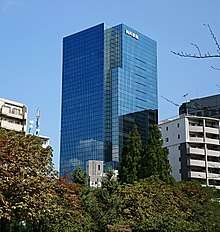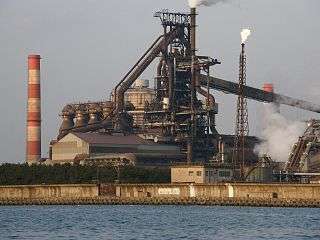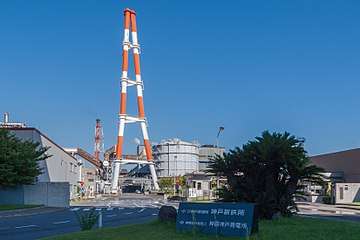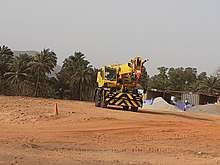Kobe Steel
Kobe Steel, Ltd. (株式会社神戸製鋼所, Kabushiki-gaisha Kōbe Seikō-sho), operating worldwide under the brand Kobelco, is a major Japanese steel manufacturer headquartered in Chūō-ku, Kobe. Kobe Steel also has a stake in Osaka Titanium Technologies.[3] The company supplies about half of the global market of the wires used in valve springs of auto engines.[4]
 Tokyo Head Office | |
Native name | 株式会社神戸製鋼所 |
|---|---|
| Public KK | |
| Traded as | TYO: 5406 OSE: 5406 NAG: 5406 Nikkei 225 Component |
| ISIN | JP3289800009 |
| Industry | Steel |
| Founded | Kobe, Japan (September 1, 1905) |
| Headquarters | 2-4, Wakinohama-Kaigandori 2-chome, Chūō-ku, Kobe, Hyōgo, 651-8585, Japan |
Key people | Mitsugu Yamaguchi, (CEO and President) |
| Products |
|
| Revenue | $ 15.87 billion (FY 2016) (¥ 1.696 trillion) (FY 2016) |
| $ -216 million (FY 2016) (¥ -23.045 billion) (FY 2016) | |
| Total assets | $ 2.233 billion (as of March 31, 2019) |
Number of employees | 39,341 (consolidated) (as of March 31, 2019) |
| Website | Official website |
| Footnotes / references [1][2] | |
It was formed on September 1, 1905. Its location in a major city port was useful for importing and exporting iron ore and coal. It is one of Kobe's oldest industrial companies.[5] Its main production facilities are Kakogawa Steel Works and Kobe Steel Works. Kobe Steel is the owner of the rugby team Kobelco Steelers.
The company is listed on the Tokyo and Nagoya Stock Exchange, on the Osaka Securities Exchange and is a constituent of the Nikkei 225 stock index.[6] As of March 31, 2019, the company had 218 subsidiary and 52 affiliated companies across Japan, Asia, Europe, the Middle East and the US.[1]
Kobe Steel is a member of the Mitsubishi UFJ Financial Group (MUFJ) keiretsu.
History
Japanese prime minister Shinzō Abe worked at Kobe Steel before entering politics.[5]
In 2016, Kobe Steel lost ¥23 billion due to cheap aluminium and steel imports.[5]
Scandal
In October 2017, Kobe Steel admitted to falsifying data on the strength and durability of its aluminum, copper and steel products.[5][7] The scandal deepened when the company said it found falsified data on its iron ore powder, which caused its shares to fall 18%. By 11 October, shares had fallen by a third.[5] After testing the parts of their bullet trains, the Central Japan Railway Company announced that 310 components were discovered to contain sub-standard parts supplied by Kobe Steel.[8][9]
Following further news in October 2017 that car makers Toyota, Nissan, and General Motors, and train manufacturer Hitachi, were among 200 companies affected by the Kobe Steel's mislabelling, which had potential safety implications for their vehicles, the CEO of Kobe Steel conceded that his company now had "zero credibility".[10] Other affected companies include Ford, Boeing and Mitsubishi Heavy Industries.[5] CEO Kawasaki promised to lead an internal investigation.[5] On 13 October 2017, Kobe Steel admitted that the number of companies misled was over 500.[11]
Despite the costs of dealing with the scandal, Kobe Steel issued a revised profit forecast in February 2018 announcing that it expects to generate a net profit of ¥45 billion ($421 million) for the full 2017 fiscal year, marking its first net profit in three years.[12][13]
Business segments and products
- Iron & Steel: ordinary wire rod, specialty steel wire rod, specialty steel wire, ordinary steel bar, specialty steel bar, heavy plate, medium plate and sheet (hot-rolled, coldrolled, surface treated), titanium and titanium alloys, foundry pig iron and pig iron for steelmaking, stainless steel tube, specialty steel products, wholesale electric power supply
- Welding: covered welding electrodes, welding wire for automatic and semi-automatic welding, flux, welding robots and welding robot systems, welding power sources, welding-related testing, analysis and consulting
- Aluminum & Copper: aluminum can stock, aluminum sheet for heat exchangers and automotive use, aluminum extrusions, aluminum disk material for HDDs, aluminum foil, copper sheet and strip for semiconductors, copper sheet and strip for terminals, aluminum alloy and magnesium alloy castings and forgings
- Machinery: equipment for nuclear power plants, equipment for energy and chemical fields, tire and rubber machinery, plastic processing machinery, metalworking machinery
- Engineering: ironmaking plants(direct reduction), other plants and equipment (pelletizing, petrochemical, etc.), nuclear power-related plants, erosion control and disaster prevention structures, civil engineering, advanced urban transit systems
- Kobelco Eco-Solutions: industrial water plants, water and sewage plants, ultrapure and pure water, industrial water and waste water treatment equipment, recycling plants for processing organic waste materials (sewage sludge and foodstuffs), municipal waste incineration and melting plants, Bulky waste recycling facilities for bulky waste, Polychlorinated biphenyl waste treatment facilities, brewing equipment, hydrogen oxygen generator, environmental analysis
- Kobelco Construction Machinery: hydraulic excavators, mini excavators, wheel loaders, road-building equipment, demolition machines
- Kobelco Cranes:crawler cranes, rough terrain cranes, work vessels
- Other: sputtering targets, superconducting products, real estate services, administration of public facilities[14][15]
Manufacturing locations
- Kakogawa, Hyōgo: Kakogawa Steel Works
- Kobe, Hyogo
- Takasago, Hyōgo
- Fujisawa, Kanagawa
- Ibaraki, Osaka
- Nishijo, Higashihiroshima, Hiroshima
- Mooka, Tochigi
- Chofu, Shimonoseki, Yamaguchi
- Daian, Inabe, Mie
- Harima, Hyōgo
- Moore, South Carolina
- Bowling Green, Kentucky, USA
- Corona, California
- Hayward, California (Kobe Precision, Inc.)[16]
Gallery
 Kakogawa Works
Kakogawa Works- Kobe Steel headquarters
 Entrance to Kobe Works
Entrance to Kobe Works
See also
References
- "Corporate Profile". Kobelco.co.jp. Retrieved April 13, 2014.
- "Consolidated Financial Results for Fiscal 2012" (PDF). Kobelco.co.jp. Retrieved April 13, 2014.
- "Key events". Osaka Titanium Technologies. Retrieved 15 August 2011.
- Inajima, Tsuyoshi; Stapczynski, Stephen (12 Oct 2017). "Kobe Steel Scandal Expands Into Core Business Overseas". Bloomberg. Retrieved 21 October 2017.
- "Kobe Steel admits falsifying data on 20,000 tonnes of metal". The Economist. 12 October 2017.
- "Components:Nikkei Stock Average". Nikkei Inc. Retrieved April 13, 2014.
- "Kobe Steel's Falsified Data Is Another Blow to Japan's Reputation". The New York Times. Retrieved 10 October 2017.
- "Bullet Train Parts Failed Quality Tests: Steel Scandal Deepens". Bloomberg News. Retrieved 11 October 2017.
- "Kobe Steel scandal deepens over quality of products used in cars and aircraft". The Guardian. Retrieved 11 October 2017.
- McCurry, Justin (12 October 2017). "Kobe Steel chief admits scandal has hit trust as car checks spread". The Guardian. Retrieved 12 October 2017.
- McLain, Sean; Tsuneoka, Chieko (2017-10-13). "Kobe Steel Admits 500 Companies Misled in Scandal". Wall Street Journal. ISSN 0099-9660. Retrieved 2017-10-13.
- Obayashi, Yuka (2018-02-01). "Japan steelmakers' profits surge; Kobe Steel reinstates forecast". Reuters. Retrieved 2018-02-26.
- "Kobe Steel expects net profit for fiscal 2017 despite data fabrication scandal". The Japan Times. 2018-02-02. Retrieved 2018-02-26.
- "Business Activities". Kobelco.co.jo. Retrieved April 13, 2014.
- "Facts & Figures Report 2012" (PDF). Archived from the original (PDF) on December 3, 2012. Retrieved April 13, 2014.
- "Kobe Precision Introduces Copper Wafer Recycling Process". Laboratory Network.com. July 14, 1999. Retrieved April 13, 2014.
External links
- Official global website (in English)
- Kobe Steel Group of Companies
- History of Kobe Steel Group
- Kobelco Construction Machinery Europe
